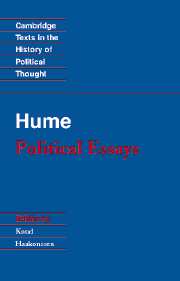Book contents
- Frontmatter
- Contents
- Acknowledgements
- Introduction
- Chronology
- Bibliographical notes
- A note on the text and the edition
- Biographical notes
- Bibliography
- Political Essays
- 1 Of the liberty of the press
- 2 That politics may be reduced to a science
- 3 Of the first principles of government
- 4 Of the origin of government
- 5 Of the independency of Parliament
- 6 Whether the British government inclines more to absolute monarchy, or to a republic
- 7 Of parties in general
- 8 Of the parties of Great Britain
- 9 Of superstition and enthusiasm
- 10 Of civil liberty
- 11 Of the rise and progress of the arts and sciences
- 12 Of national characters
- 13 Of commerce
- 14 Of refinement in the arts
- 15 Of money
- 16 Of interest
- 17 Of the balance of trade
- 18 Of the jealousy of trade
- 19 Of the balance of power
- 20 Of taxes
- 21 Of public credit
- 22 Of some remarkable customs
- 23 Of the original contract
- 24 Of passive obedience
- 25 Of the coalition of parties
- 26 Of the Protestant succession
- 27 Idea of a perfect commonwealth
- Appendix: Excerpts from Hume's History of England
- Notes
- Index
- Title in the Series
20 - Of taxes
Published online by Cambridge University Press: 05 June 2012
- Frontmatter
- Contents
- Acknowledgements
- Introduction
- Chronology
- Bibliographical notes
- A note on the text and the edition
- Biographical notes
- Bibliography
- Political Essays
- 1 Of the liberty of the press
- 2 That politics may be reduced to a science
- 3 Of the first principles of government
- 4 Of the origin of government
- 5 Of the independency of Parliament
- 6 Whether the British government inclines more to absolute monarchy, or to a republic
- 7 Of parties in general
- 8 Of the parties of Great Britain
- 9 Of superstition and enthusiasm
- 10 Of civil liberty
- 11 Of the rise and progress of the arts and sciences
- 12 Of national characters
- 13 Of commerce
- 14 Of refinement in the arts
- 15 Of money
- 16 Of interest
- 17 Of the balance of trade
- 18 Of the jealousy of trade
- 19 Of the balance of power
- 20 Of taxes
- 21 Of public credit
- 22 Of some remarkable customs
- 23 Of the original contract
- 24 Of passive obedience
- 25 Of the coalition of parties
- 26 Of the Protestant succession
- 27 Idea of a perfect commonwealth
- Appendix: Excerpts from Hume's History of England
- Notes
- Index
- Title in the Series
Summary
There is a prevailing maxim, among some reasoners, that every new tax creates a new ability in the subject to bear it, and that each encrease of public burdens encreases proportionably the industry of the people. This maxim is of such a nature as is most likely to be abused; and is so much the more dangerous, as its truth cannot be altogether denied: but it must be owned, when kept within certain bounds, to have some foundation in reason and experience.
When a tax is laid upon commodities, which are consumed by the common people, the necessary consequence may seem to be, either that the poor must retrench something from their way of living, or raise their wages, so as to make the burden of the tax fall entirely upon the rich. But there is a third consequence, which often follows upon taxes, namely, that the poor encrease their industry, perform more work, and live as well as before, without demanding more for their labour. Where taxes are moderate, are laid on gradually, and affect not the necessaries of life, this consequence naturally follows; and it is certain, that such difficulties often serve to excite the industry of a people, and render them more opulent and laborious, than others, who enjoy the greatest advantages. For we may observe, as a parallel instance, that the most commercial nations have not always possessed the greatest extent of fertile land; but, on the contrary, that they have laboured under many natural disadvantages.
- Type
- Chapter
- Information
- Hume: Political Essays , pp. 161 - 165Publisher: Cambridge University PressPrint publication year: 1994
- 1
- Cited by



